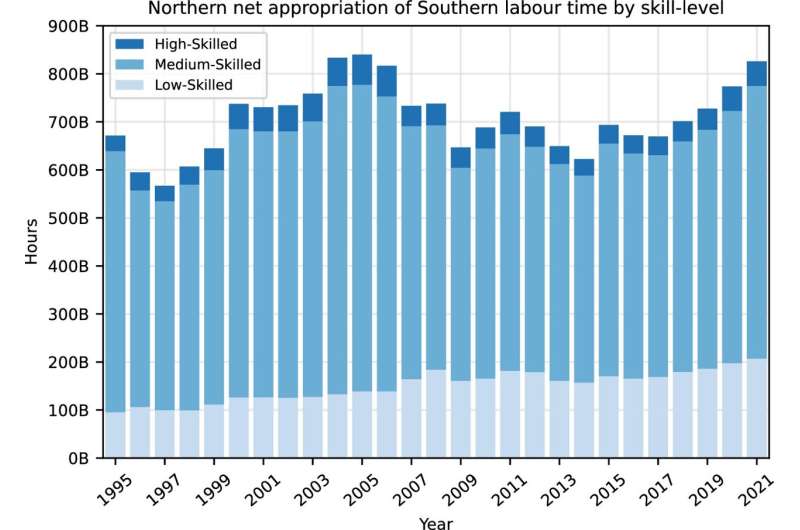This article has been reviewed according to Science X's editorial process and policies. Editors have highlighted the following attributes while ensuring the content's credibility:
fact-checked
peer-reviewed publication
trusted source
proofread
Massive appropriation of labor from the Global South enables high consumption in rich countries

The high levels of consumption enjoyed by wealthy countries in the Global North are only possible because of mass appropriation of labor from the population of the Global South. This is evidenced by research from the Institute of Environmental Science and Technology at the Universitat Autònoma de Barcelona (ICTA-UAB), which indicates that this appropriation takes place through unequal exchange in international trade and global commodity chains.
The new study, published in Nature Communications, measured the flows of labor embodied in traded goods around the world from 1995 to 2021. The results show that in 2021, the Global North imported 906 billion hours of embodied labor from the South while exporting only 80 billion hours in return. In other words, for every hour of labor the Global South imports from the Global North, they must export 11 hours to "pay" for it.
As a result, the countries of the Global North net-appropriated 826 billion hours of labor from the Global South, across all skill levels and all sectors: mining, agriculture, manufacturing and services. The figure of 826 billion hours is more than the labor rendered by the entire workforce of the United States and Europe combined.
The wage value of this net-appropriated labor was equivalent to €16.9 trillion in 2021, in Northern prices. In other words, this is how much the appropriated labor would be worth if it was paid at prevailing Northern wages, with equal wages for equal work.
"These are staggering figures. It shows that very large quantities of value flow from the South to the North each year" says Jason Hickel, researcher at ICTA-UAB and the Department of Anthropology at the UAB. "The Global North grows rich by siphoning value out of the South."
Unequal exchange occurs because of systematic price inequalities in the world economy. Powerful states and corporations in the Global North seek to compress wages and supply prices in the Global South, to obtain inputs and other goods more cheaply. Producers in the Global South are then forced to export more goods and services in order to buy any given level of imports.
This results in large net-transfers from the Global South to the Global North, which benefits Northern firms and consumers but drains the Global South of productive capacities that are necessary for development.
"Labor that could be used to improve human development in the Global South is instead appropriated to service capital accumulation in the Global North," said co-author Morena Hanbury Lemos, also of ICTA-UAB. "This is a major driver of deprivation in the South, and it needs to be addressed," she says.
According to the study, wages in the Global South are between 87% and 95% lower than Northern wages for work of equal skill, and between 83% and 98% lower for work of equal skill within the same sector. Wage inequalities are so extreme that high skill labor in the Global South is paid only one-third the wages of low-skill labor in the Global North.
The net-appropriated labor accounts for roughly one half of total consumption in the Global North. This means that in the absence of unequal exchange, Northern consumption would decline by 50%, or Northern workers would have to double their working hours to compensate.
The study found that Southern workers contribute 90% of the labor that powers the world economy. But the benefits of this labor are accumulated disproportionately in the Global North. Southern workers receive only 21% of global income.
"People tend to assume that the South provides low-skill labor in agriculture and mining, in return for high-skill labor in manufacturing and service sectors from the Global North. But that's not how it works in the contemporary world economy," says co-author Felix Barbour, of the Beijer Institute of Ecological Economics at the Royal Swedish Academy of Sciences.
"In reality, the South provides the majority of labor across all skill-levels and all sectors. In fact, the Global North net-appropriates more high-skill labor from the global South than it obtains from North–North trade."
To overcome this problem, researchers indicate that countries in the Global South need to use industrial policy to reduce their dependence on imports from the Global North, and to remobilize their productive capacities around what is most necessary for human needs and national development objectives.
More information: Jason Hickel et al, Unequal exchange of labour in the world economy, Nature Communications (2024). DOI: 10.1038/s41467-024-49687-y
Journal information: Nature Communications
Provided by Autonomous University of Barcelona




















